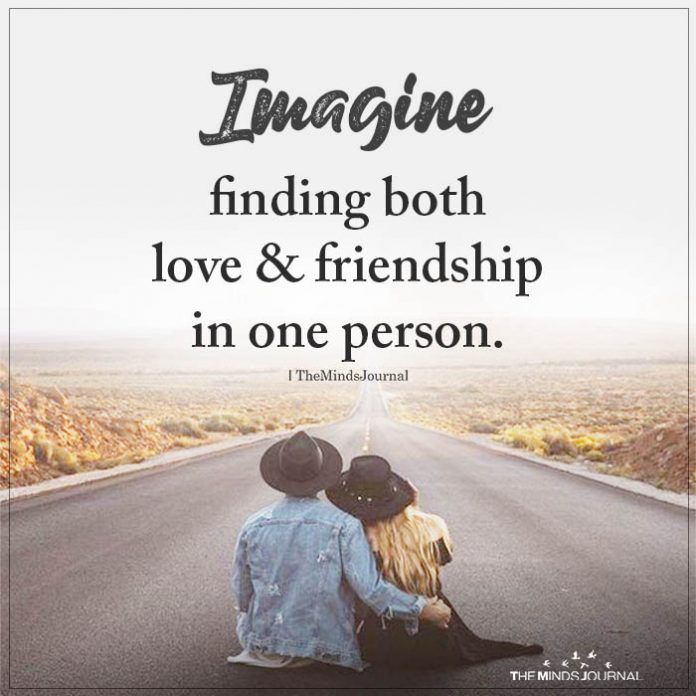Wanting to love someone and be in a happy relationship is something that most people look for in their love. After all, a stable relationship can bring about a lot of positive change in your life.
But, sometimes finding the right partner can be quite a challenge, isn’t it? If you are someone, who is on a quest to find the right partner for yourself, then you will have to consider a few important things.
The Best Way to Find a Partner Who’s Right for You
Hint: It’s not by seeking the best person.
“I love you not only for what you are but for what I am when I am with you.” —Elizabeth Barrett Browning
“Love thy neighbor—and if he happens to be tall, debonair and devastating, it will be that much easier.” —Mae West
People sometimes think that by finding the perfect person, they will find their perfect partner. They are wrong. In my new book, The Arc of Love: How Our Romantic Lives Change over Time (2019), I argue that suitability, not perfection, is the name of the romantic game. Interestingly, two imperfect people can form a perfect romantic relationship.
The suitability and nonrelational scales
“When I love, I do it without counting. I give myself entirely. And each time, it is the grand love of my life.” —Brigitte Bardot
There are two scales with which to assess romantic value: the nonrelational scale (which is a general measure of people) and the relational scale of suitability (which measures a unique connection). The nonrelational scale measures the value of traits as they stand on their own (think a sense of humor, wealth, etc.). This sort of measure has two advantages: It is easy to use, and most people would agree about the assessments.
The suitability scale is much more complex since it depends on personal and environmental factors about which we do not have full knowledge. Let’s think for a moment about assessing the relational suitability value in long-term relationships. Should you marry a smart person? Generally speaking, intelligence is considered good—but here is where things get more complicated. If there is a big gap between the IQ of the two partners, their suitability value will be low, as matching in nonrelational value is more significant here. This goes way beyond intelligence, though.
“It’s so easy to fall in love but hard to find someone who will catch you.”
The same goes for wealth. On the nonrelational scale, a lot of money is often good, but a wealthy person might score low on fidelity, as fat bank accounts open many romantic doors. Moreover, wealthy people tend to believe that they are more deserving, and hence their caring behavior might be lower.
In the same vein, having a good sexual appetite is usually good, but a large discrepancy between the partners’ sexual needs is not conducive to that crucial romantic connection. If, for instance, a man wants to have sex once or twice a week and a woman wishes to have sex multiple times a day, would they be suitable partners?
If all the positives on someone’s nonrelational scale are reduced by aspects on the relational scale, this is likely to bode ill for the individual’s personal flourishing. Even if both partners score high on the nonrelational scale but they are not able to bring out the best in each other, then their value on the relational scale will below.
Predicting romantic value
“To keep a marriage, the husband should have a night out with the boys and the wife should have a night out with the boys, too.” —Zsa Zsa Gabor
As it turns out, we can tell precious little about how someone will be as a partner by knowing how he or she rates as a person. It is far from obvious that the higher your partner is on the nonrelational scale, the better the connection between you will be.
In this context, the following friendly interchange comes to mind. Woman: “Why is it that the people I fall in love with are never interested in me, whereas the ones who do fall in love with me are never the ones I care about?” Coworker: “You’re an 8 constantly chasing after 10s, and constantly being chased by 6s” (Frank, 2006).
Romantic love takes all traits into full account. Since love includes the wish to be together with each other for a long time, we should try to transform the pleasant interest that is evoked by attraction into something more profound than can be maintained in the long term. The relational suitability scale can be of service here. It measures suitability to an actual person, not to people in general. This scale analyzes the general overall romantic value in terms of a specific partner.
“Sometimes it’s a form of love just to talk to somebody that you have nothing in common with and still be fascinated by their presence.”- Albert Ellis
At the initial stage of romantic relationships, suitability is not such a big deal. After all, information about long-term profound suitability is not yet available. Such information comes from interactions between the two partners, as a loving attitude becomes more knowledge-based. As time goes by, the issue of suitability gains greater importance, and the gap between the two scales could grow. We update and refine the two scales over time.
With time, changes in each scale relate mainly to the weight given to each trait, and to a lesser extent to the score of that trait on each scale. A woman whose spouse is not particularly sensitive might say that, over time, his lack of sensitivity disturbs her less (she assigns it less weight), since she finds that his other traits compensate for it. However, she might also say that he seems to her a little bit more sensitive than she initially thought. Scholars call this “trait adaptation.”
In hedonic adaptation, something beautiful or ugly becomes less so with time. In trait adaptation, some of the partner’s characteristics, which were initially seen as very positive or very negative, come to be evaluated more moderately. Romantic breakups are often traceable to traits that have a low score on the suitability scale that become more evident with time rather than to traits that have a low score on the nonrelational scale to which people may adopt.

These two scales raise interesting issues about the nature of long-term romantic love. One of these is the possibility of predicting the success of love. As others can assess the nonrelational scale quite well, this assessment is possible even before the partners meet.
The relational scale, however, is different. There, many traits cannot be assessed by others, and most of this evaluation must wait until the partners meet and interact. Because reciprocal interactions are so important, the main traits can only be reliably assessed after such interactions.
Indeed, the renowned expert on marital stability John Gottman (1995), who is immensely successful in predicting the likelihood of divorce, bases his judgments on partners’ interactions during conflicts in verbal communication. The relational suitability scale assesses the suitability of the partner’s nonrelational traits to the individual.
Do the two scales correlate?
“Men reach their sexual peak at 18. Women reach theirs at 35. Do you get the feeling that God is playing a practical joke?” —Rita Rudner
Both nonrelational and relational traits can enhance romantic love. Although there is no direct positive correlation between the two groups, they often correlate—a high value in one group often increases the value in the other. Thus, rich and intelligent people are often able to enhance the romantic connection, and a caring person is frequently considered of higher overall value.
Moreover, as the possibility of lasting love draws heavily on the connection between the two lovers, relational traits are far more important in the long term. Nonrelational traits have a greater impact at the beginning of the romantic relationship when the relational traits are not yet apparent. As the two lovers become more familiar with each other, the impact of their relational traits increases.
High positive evaluation of one’s nonrelational qualities is significant—but it is no guarantee of profound romantic love. Being a person who has good nonrelational qualities does not make you a good partner—and it is only with a good partner that we can nurture an intimate, flourishing connection.
“Love unlocks doors and opens windows that weren’t even there before.” – Helen Rowland
People often search for the ideal partner by focusing on the qualities that make a perfect, flawless person. The problem is that this quest fails to focus on the connection between the would-be couple. Romantic relationships benefit from nonrelational traits in a kind of backhanded way; they offer better circumstances in which to enhance relational traits—and, therefore, the connection. Being married to an optimistic person, for example, can upgrade the couple’s relational activities because a sense of optimism can improve dialogue. At the end of the day, though, the value of the relational traits on the suitability scale is what counts most.
Along these lines, Paul Eastwick and Lucy Hunt (2014) show that when people are picking partners, they focus more on relational characteristics than consensual, nonrelational traits, especially over time. They found that although there was a lot of agreement on desirable (nonrelational) qualities at first, this agreement was weaker than participants’ tendency to see one another as uniquely desirable or undesirable over time. Eastwick and Hunt conclude that despite the unbalanced distribution of desirable nonrelational traits among people, “mating pursuits take place on a more-or-less even playing field, in which most people have a strong chance of being satisfied with their romantic outcomes” (2014, 729).
All of this boils down to the idea that constant comparison of your partner to others is contrary to the spirit of profound romantic love. Long- term lovers are not in the business of accounting and comparing—they are more occupied with bettering their relationship than in having a better partner than someone else.
Concluding remarks
“I love going out to dinner with good- looking men, even though good-looking does not buy the meal; however, with an ugly man, I cannot eat at all.” —A single woman
The main reason for the complexity in choosing a long- term partner is the fact that a good match can hardly be determined by pre-existing nonrelational traits; only ongoing interactions can reveal and establish a suitable match. The major issue is not how good each partner is but rather how suited they are to each other. In choosing a partner, the suitability scale is much more significant than the nonrelational scale.
Finding the right partner for yourself might seem intimidating and at times, frustrating. But, if you keep doing this in the right way and take into consideration all the vital points mentioned above, you will find the perfect person, be rest assured. After all, nothing worthwhile comes easy.
If you want to know more about finding the right partner, then watch this video below:
This post is adapted from my new book, The Arc of Love: How Our Romantic Lives Change over Time (2019).
References:
- Ben-Ze’ev, A. (2019). The Arc of Love: How our romantic lives change over time. University of Chicago Press.
- Brown, R. (1987). Analyzing love. Cambridge University Press.
- Eastwick, P. W., and L. L. Hunt. (2014). Relational mate value: Consensus and uniqueness in romantic evaluations. Journal of Personality and Social Psychology, 106, 728– 51.
- Frank, R. H. 2006. When it comes to a search for a spouse, supply and demand is only the start. New York Times, December 21, 2006.
- Frankfurt, H. G. 1987. Equality as a moral ideal. Ethics, 98, 21– 43.
Written By Aaron Ben-Zeév Ph.D.
Originally Appeared In Psychology Today
You May Also Like:
11 Ways Love Feels Differently When You’re With The Right Person
The Honest Truth About Finding The Right Partner That Most People Fail To Understand
What’s Most Important When Choosing A Life Partner
5 Things That Prove You’ve Found The Right Partner For You









Leave a Reply
You must be logged in to post a comment.